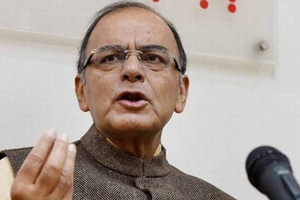New Delhi, Mar 28: Both the Hyderabad Central University (HCU) and JNU events were “ultra-Left movements” also involving a small section of “jehadis”, Finance Minister Arun Jaitley contended on Sunday.
 In the case of JNU, the predominant section of those involved in the agitation was “ultra-Left” barring a small section of “jehadis”, who had their faces masked during a demonstration on the campus on Feb 9 in which anti-national slogans were raised, he said.
In the case of JNU, the predominant section of those involved in the agitation was “ultra-Left” barring a small section of “jehadis”, who had their faces masked during a demonstration on the campus on Feb 9 in which anti-national slogans were raised, he said.
The name of Dr B R Ambedkar was “unfairly used” in the case of HCU where protests erupted after the suicide by a research scholar Rohith Vemula, Jaitley said during an interaction with PTI journalists here.
He drew satisfaction from the fact that religious and minority groups and their leaders across the country had not participated in the debate set off by the events in the two universities.
“The moderate Left and the Congress had got trapped into what was otherwise a movement of the ultra-Left,” the minister said, adding that the BJP had therefore taken it as an ideological challenge.
The BJP had won the first round of this “ideological debate” in the sense that everybody had to come at least “close to the position we were taking”.
Asked if he expected more rounds in the debate, the BJP leader said that it was not a battle his party had started. “We are not raising the debate to this extent (of further rounds) but if somebody against starts the whole idea, then the debate will certainly carry on.”
When asked if the BJP was reaping political dividends by raising the nationalism debate, Jaitley said, “I am not looking for a dividend. This was an ideological positioning and we have made our point. On this battle I don’t think we can lose.”
Jaitley said they took it as an ideological challenge and “whether for posturing or otherwise, as the core debate proceeded....at least they were pushed into this position (to say Jai Hind instead of Bharat Mata Ki Jai). I am quite happy and satisfied that they were pushed into this position.”
Answering questions, Jaitley saw no contradiction between the government's agenda of development and the debate over nationalism.
“I think there is a section in this country, however small, which does not find this discourse very fascinating. So it wants to divert the issue.
“It is not compulsory in this country to raise a slogan (of Bharat Mata ki Jai). But it became an issue only when somebody said I take objection and I will not raise it,” he said in an apparent reference to a declaration made by Majlis MP Asaduddin Owaisi.
Asked if it was an overkill to slap sedition charges against JNU students union President Kanhaiya Kumar, Jaitley said it was a legal issue and he would not like to get into it.
PTI
"That is a matter of individual culpability. Whether he is technically liable, what sections should he be prosecuted for and whether he should be prosecuted or not. I do not want to prejudice the trial even against him or for that matter anybody else.
"There are slogans being raised that this country will be broken up by 'jung' (war). We will break up this country by jung. And an individual goes and participates in this unlawful assembly where this resolve is being made. So whether he is legally liable or not, is a question which courts will have to look into," he said.
Attacking the Congress, Jaitley said people from mainstream parties should have thought twice before joining an unlawful assembly which is talking of a 'jung' to break this country.
"In Parliament I had said there are two types of people--one who think first and then act and the other who act first and then think. Congress leaders first took the step. They went and joined and preached that this 'break up of this country' slogan is free speech and we have come here to defend this free speech."
The minister contended that the overwhelming majority of this country has disapproved of the very character of the anti-India slogans.
He said he was personally in favour of "radical romancing" in universities in which one says something not very responsible out of extra enthusiasm which after 10 years he realises that it was not the most sensible thing to do.
"You can give a licence for that. But I think having said that somehow to speak in terms of 'desh ki barbadi, desh ke tukde, tukde', I think this crossed all limits," he said.





Comments
Cheddi chelas alwz taught to view as opposite..
Better to send him back Britian.
the agent of British now singing again the British tune.
Add new comment